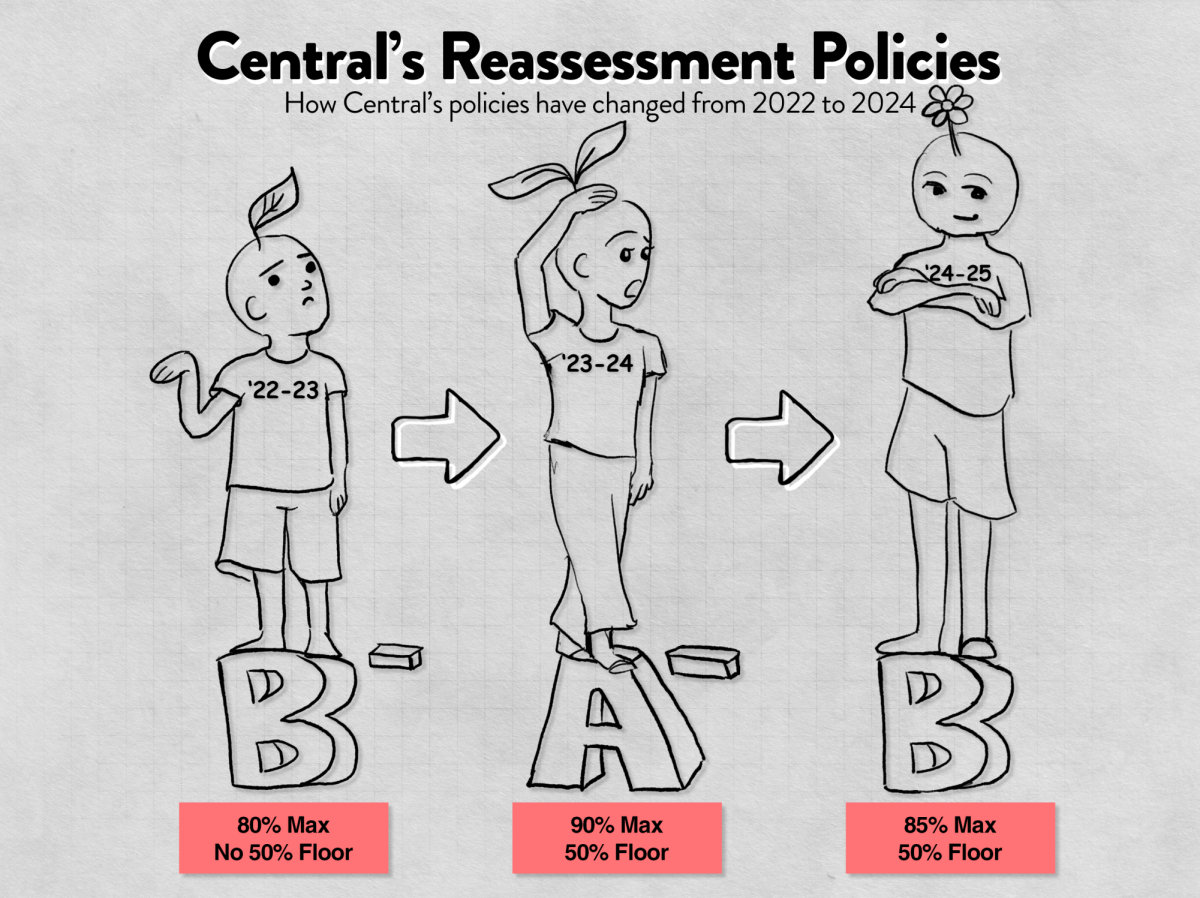District 203 standardized the maximum score high school students can receive on reassessments, cutting the bar from 90% to 85% at Naperville Central and raising it from 80% to 85% at Naperville North for the 2024-25 school year.
The district also modified reassessment eligibility requirements as part of an update to the grading beliefs statement. The new criteria requires that students score below an 85% on a summative assessment, regularly score high on practice assessments and complete all assigned practice work. Projects with “multiple opportunities for feedback and improvement” cannot be reassessed.
“It’s the first step in what I hope will be a shift that’s towards learning instead of points, towards being involved in the process, [towards] students and teachers interacting in the learning process and making the necessary adjustments,” Principal Jackie Thornton said. “Students are taking that feedback and applying it to their summative assessments—that should lead to fewer reassessments needed. It’s not good for teachers or for students to be caught in that reassessment process and not be able to fully focus on what’s currently [being] taught and learned,”
This is the second consecutive year of school wide grading policy updates. Last year’s updates implemented the “practice” and “evidence of learning” categories, required full completion of practice work for reassessment eligibility and raised the maximum reassessment score to 90%, from 80% two years ago.
Dr. Steven Jeretina, Assistant Principal for Curriculum and Instruction, has led these grading updates. Last year, he said that the updates were intended to help both high schools to “operate similarly” on grading. However, the two schools’ reassessment policies remained substantially different, according to reporting by the Central Times in Sept. 2023.
“[Last year] was probably the closest that Central and North had been about grading beliefs and reassessment in some time,” Jeretina said. “The work that has led to what we’re doing this year brings us even closer.”
According to Jeretina, the goal of the grading policy updates is to respond to evolving parent, teacher and student feedback more than reach a consistent grading policy for years to come.
“We’re not looking for a certain percentage of students who are crossing a specific threshold,” Jeretina said. “How are teachers and students conversing about student progress? I think that’s a big factor of [evaluating the policies]. So much of what we do in learning comes down to a conversation.”
Previously, Central’s grading policies did not punish students for low grades on practice assessments or homework beyond their direct impact in the gradebook. Now, students who regularly get C’s on practice assessments will not be able to reassess above a C on the unit test.
“I appreciate that there are stipulations to get a retake so that students feel like they have to work a little bit in order to earn a retake because it’s very frustrating when some students don’t put effort in, don’t do any homework, and they just [think] ‘well, I’ll just retake it,’” math teacher Lisa Gebbie said. “But on the other side, I do think it’s sometimes a little strict and harsh. The idea that if you miss one homework assignment, you’re completely ineligible—I feel like there needs to be tiers of [reassessments] so if you didn’t do everything you needed to do, I [still] really care about you as a student and I really don’t want you to fail.”
In those instances, Jeretina encourages teachers and teams to modify policies as needed for the benefit of student learning.
“We ask our teachers to use professional judgment in situations where a student needs a little bit [of] extra time,” Jeretina said. “Let’s try not to make this so black-and-white that there’s no gray [area] when it comes to that.”
Teachers were told about the policy update during the institute days on the week of Aug. 12, although administrators had hinted at grading policy changes as early as last Spring, according to Jeretina.
“We as teachers appreciate knowing what the policy is going to be that year sooner than right before the school starts,” Gebbie said. “If I hear a new change the day before the school starts it’s hard for me to mentally prepare for what it’s going to be like if [administration] just starts throwing the change at me.”
The updates are part of a broader change to move towards a four-point grading system using standards-based reporting, according to Thornton and Jeretina. It was one of two grading pilots first implemented in the 2022-23 school year, the other being a 50% floor now standard across all high school classes.
“[The four-point scale] would be definitely a long-term look because it’s just a big philosophical shift from what students know, from what staff know and what parents know,” Jeretina said. “It would be very clearly articulated, it would be over time just to make sure that people understand the ‘why’ behind it and that the intent is certainly to benefit students and student learning.”
When fully implemented, the four-point grading system won’t include reassessments, according to Thornton. Instead, students can use the next assessment as a “re-performance” opportunity.
“That shift means that there isn’t a reassessment opportunity,” Thornton said. “Re-performance is happening throughout the course—if you didn’t demonstrate grade-level proficiency on the skill in the first unit, you’re going to keep working on that skill in unit two. It isn’t a reassessment, it’s just that we’re continuing to demonstrate our proficiency of that skill throughout the course of the [semester].”





